India Indian music music vocalists
by Warren
1 comment
Meta
SiteMeter
Brighter Planet
78 rpm Records of Indian Music: Mukul – “Haldi Ghaati”
Just the name Mukul.
This double-sided geet in Rajasthani sounds more like standard light-music performances, lacking the propulsive beat of traditional Rajasthani music. Damned if I know what “Haldi Ghaati” means.
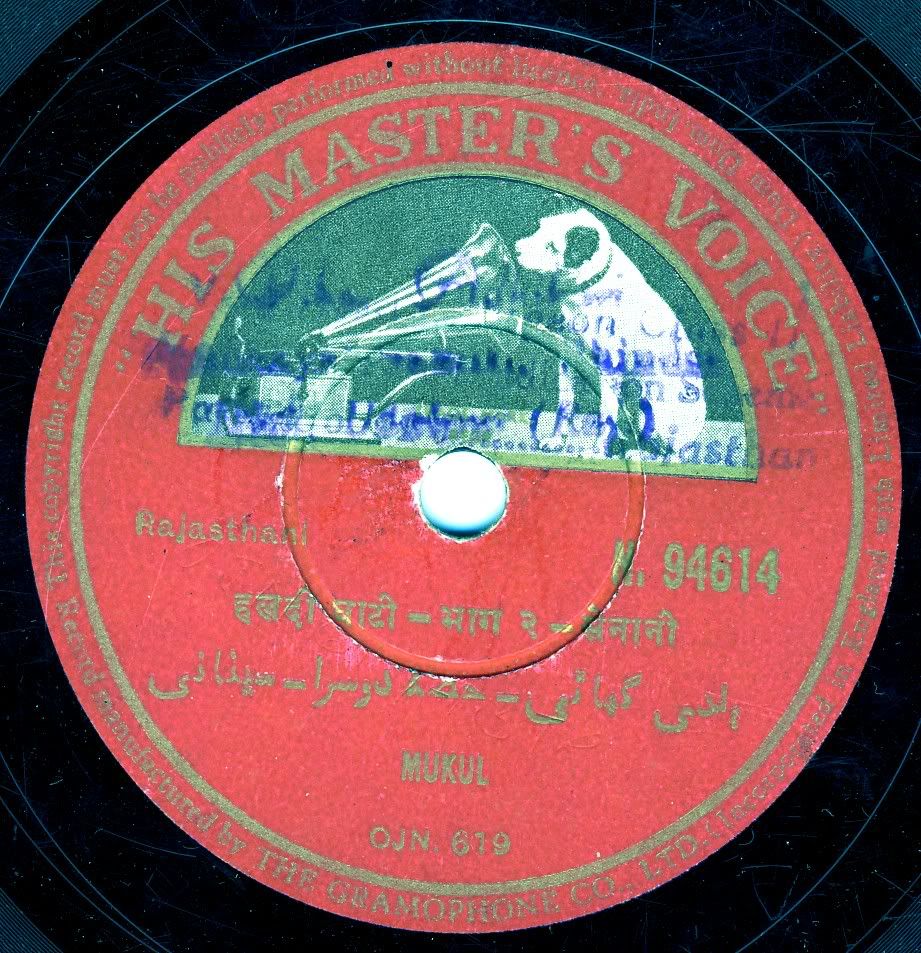
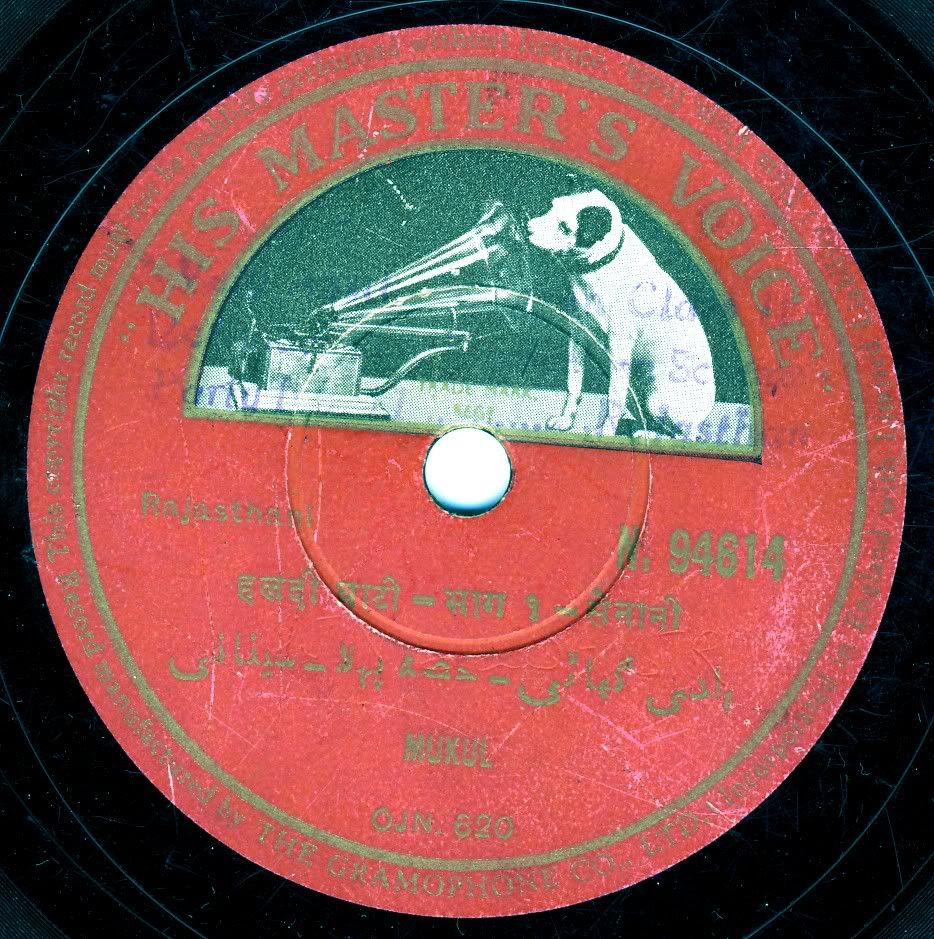
Haldi Ghaati
India Indian music music vocalists: 78 rpm discs
by Warren
2 comments
Meta
SiteMeter
Brighter Planet
78 rpm Records of Indian Music: Mr. Bhagoo of the New Alfred D. Company
Mr. Bhagoo, as the record label tells us, was one of the singers affiliated with the New Alfred D. Company, perhaps the most prominent theater group presenting Hindi and regional language drama at the beginning of the twentieth century.

His fine melismatic technique allows him to incorporate some tappa-ang taankari in this short performance.
Jake Chitme Chinta Buse
India Indian music music: 78 rpm discs genius
by Warren
1 comment
Meta
SiteMeter
Brighter Planet
78 rpm Records of Indian Music: Ali Ahmed Hussain – Shehnai
Ustad Ali Ahmed Hussain may not be as widely known as the great Shehnai master Bismillah Khan, but he’s an extraordinary player with a beautiful tone and a wonderfully lyrical approach:
Ustad Ali Ahmed Hussain Khan of Allahabad, the acknowledged premier shehnai specialist of Eastern India was born in Calcutta on March 21, 1939. His grand-father late Ustad Wazir Ali Khan was the first to demonstrate Indian classical music on shehnai at Buckingham Palace. His father late Ustad Ali Jan Khan and gurus late uncle Ustad Nazir Hussain Khan and late Ustad Imdad Hussain Khan of Benares were also renowned shehnai specialists. He presents shehnai in a soft, subtle and sweet tone enriched with melodious and mellifluous patterns. The purity of raags in his performances is a hallmark of his steadfastness to tradition. He has taught shehnai at Sangeet Research Academy, Calcutta since 1974.
He’s still playing, and he’s got his own website.
Enjoy these two short pieces of light classical music for their lilting melody and graceful improvisations
Kajri
Dadra
India Indian music music vocalists: 78 rpm discs
by Warren
1 comment
Meta
SiteMeter
Brighter Planet
78 rpm Records of Indian Music: The Twin Dramatic Party
This two-side-long piece is part of a drama in Urdu, based on the story of “Khosrow and Shirin”:
“Khosrow and Shirin” (Persian: خسرو و شیرین) is the title of several Persian epic poems. The essential narrative is a love story of Persian[1] origin, which is found in the great epico-historical poems of Shahnameh and which is based on historical figures that were elaborated and romanticized by later Persian poets. Variants of the story were also told under the titles “Khosrow and Farhad” and “Farhad and Shirin”.


Shirin Pharhaad
India music vocalists: 78 rpm discs
by Warren
1 comment
Meta
SiteMeter
Brighter Planet
78 rpm Records of Indian Music: Pandit Chand Narayan
No information is available about Pt. Chand Narayan. These two songs in Raga Bhairavi and Sindhu Bhairavi are beautiful performances with a pervasive ethos that rises up out of the swirling distortion and surface noise.

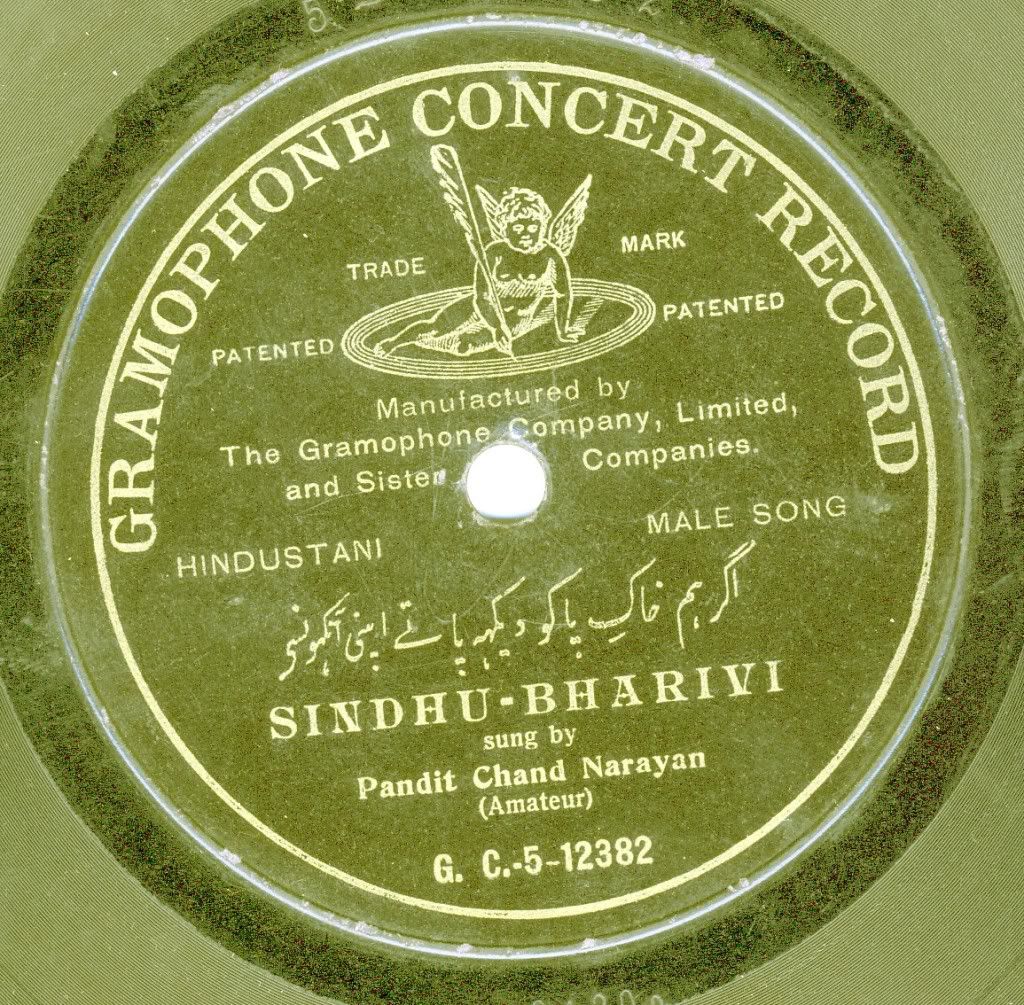
Ghazal in Raga Bhairavi
Raga Sindhu Bhairavi
India Indian music music: 78 rpm discs genius pakhawaj rhythm tabla
by Warren
1 comment
Meta
SiteMeter
Brighter Planet
78 rpm Records of Indian Music: Ustad Amir Hussain Khan and Pt. Madhavrao Alkutkar
Here is another great set of rhythmic music — a tabla/pakhawaj duet between Ustad Amir Hussain Khan and Pt. Madhavrao Alkutkar. These 78s were part of the group I acquired stateside from another collector who had no interest in Indian music.
The two artists play two different taals side by side. Jhaptaal and Jhampa have the same number of beats (10), while Rupak and Dhamar are 7 and 14 beats respectively. The performances are too short…but brilliant!
Enjoy.
Jhaptaal aur Jhampa
Rupak aur Dhamar
India Indian music music: 78 rpm discs genius pakhawaj rhythmic cycles
by Warren
leave a comment
Meta
SiteMeter
Brighter Planet
78 rpm Records of Indian Music: Pt. Govindrao Burhanpurkar – Pakhawaj
Here is a two-sided performance of Chautaal by the pakhawajiya Govindrao Burhanpurkar. Amazing stuff:
India Indian music music: 78 rpm discs Dance genius
by Warren
1 comment
Meta
SiteMeter
Brighter Planet
78 rpm Records of Indian Music: Kathak Dance by Sitara Devi
Here is a very unusual item: four 3-minute performances of Kathak dance by the great Sitara Devi:
Sitara Devi (born early 1920s on a Diwali day) is an eminent Indian dancer of the classical Kathak style of dancing. When she was in her teens, Rabindranath Tagore, after watching a performance by her described her as Nritya Samragini, meaning, the empress of dance. The epithet continues, and she is still described as the Kathak queen.
Wiki
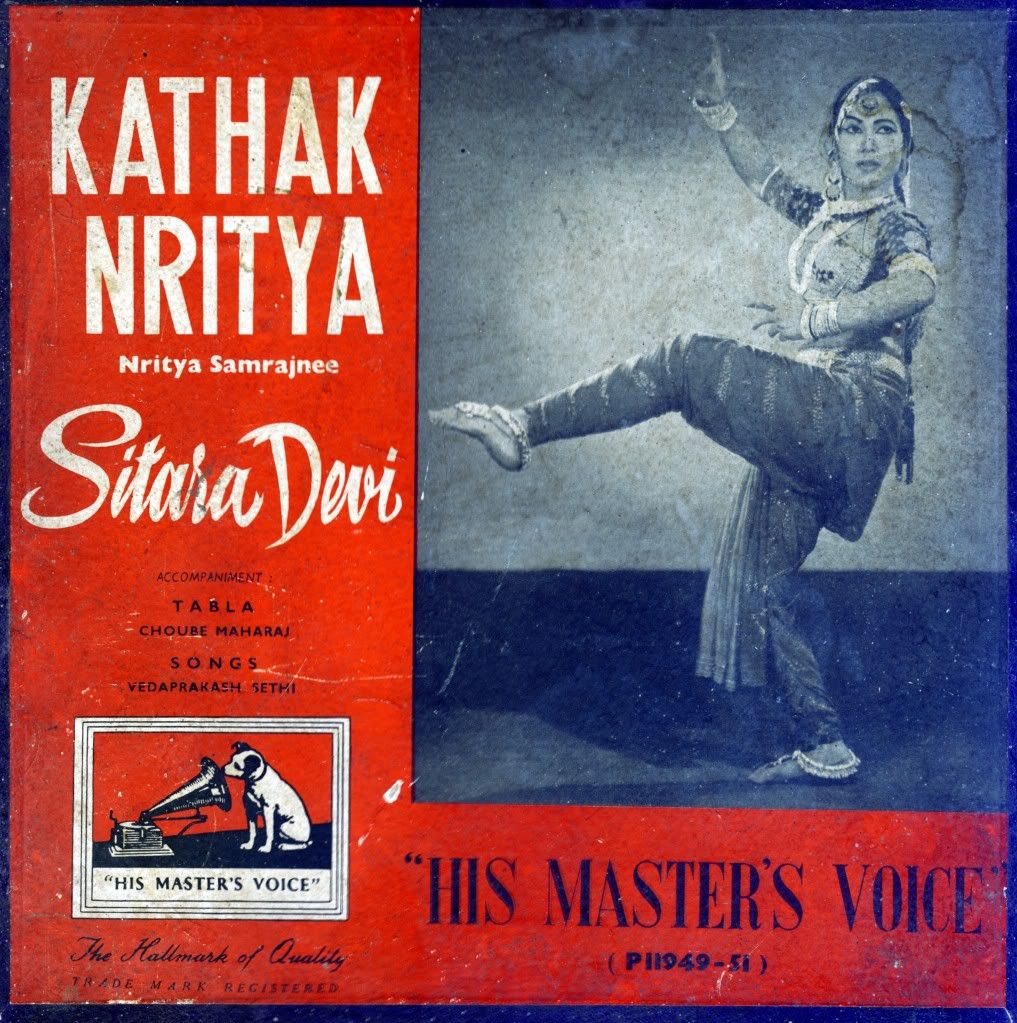
This rare boxed set was part of a group of 78s that were sent to me by a fellow collector.
Sitara Devi is among the great dancers of modern India. Born in Calcutta, she was trained in Kathak by her father Shri Sukhdev Maharaj Misra and by masters of Lucknow gharana including Achhan Maharaj, Lachhu Maharaj and Shambu Maharaj. She has combined the traditions of Banaras and Lucknow in her performance of Kathak.
An exhaustive treatment of the entire gamut of nritta, sometimes in different talas, interspersed with gats of lyrical beauty and compositions of dramatic intensity followed by moving renditions of thumris and Bhajans constitute the format of her hours long performances, characterized by an electrifying energy. In many ways she represents a lost era of complete Kathak performed all night with the accompaniment of masters of Tabla like Kanthe Maharaj, Samta Prasad and Kishan Maharaj.
Sitara Devi has danced extensively in India and abroad contributing to the popularization of the art. She has also been an actess and dancer in films since the silent era. In a class of her own, she continues to inspire her audience and fellow artists.
She has been honoured with the Sangeet Natak Akademi Award (1969) and the Padma Shri.
Moordhan Poornam & Trotakam
Parahang
Padakriya (Tatkar)
Tarana
India Indian music music: 78 rpm discs genius
by Warren
2 comments
Meta
SiteMeter
Brighter Planet
78 rpm Records of Indian Music: Ustad Abdul Aziz Khan
Four performances by the great vichitra veena artist Ustad Abdul Aziz Khan.
Ustad Abdul Aziz Khan.
Originally a Sarangi player in Mumbai, he was the first person to play Khayals and Thumris in Vichitra Veena. After his maiden performance, at the annual music conference of the Gandharva Mahavidyalaya, Lahore, he never had to look back. He preferred Tabla accompaniment to Pakhawaj. He had been the court musician to the Maharaja of Patiala.
The Vichitra Veena emerged towards the beginning of the twentieth century and is descended from the ektantri veena or the ghoshvati veena as it was known, prior to the 6th century. It shared the same sound production techniques as the ektantri. The credit of giving the vichitra veena its present shape and developing its modern style of playing goes to Abdul Aziz Khan, a former sarangi player of Patiala. Today, the vichitra veena remains a rare instrument, with not many artists who play this instrument.
Raga Darbari Kanada — a different performance of this raag from the one posted earlier (he doesn’t give himself any daad, for one thing):
The beautiful compound morning raga Jogiya Asavari:
Raga Misra Pilu:
Raga Bhairavi:
India Indian music music: 78 rpm discs genius sitar
by Warren
1 comment
Meta
SiteMeter
Brighter Planet
78 rpm Records of Indian Music: Ustad Vilayat Khan
These sides feature Vilayat Khan at the early height of his powers. Listening through the surface noise and distortion is worth it; he plays with intensity, concentration and emotional clarity in a way that has never been duplicated.
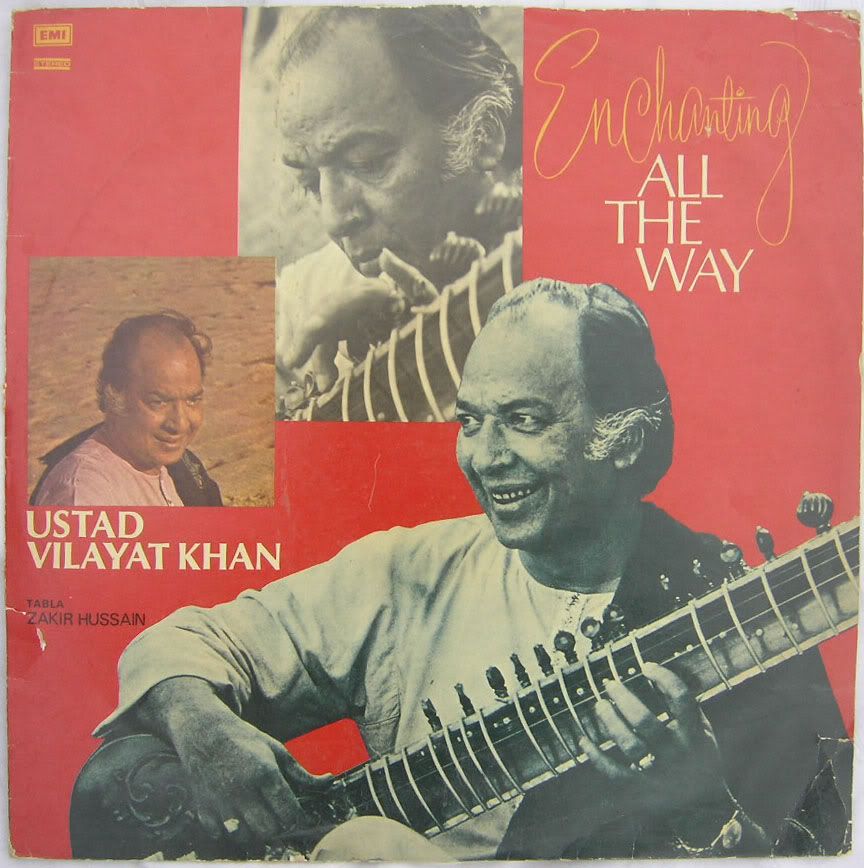
This is not the cover of the record you are listening to.
Wiki:
Vilayat Khan was born in Gauripur, British India to Enayat Khan, a sitar maestro. His family of musicians trace their pedigree back to the court musicians of the Mughals. His father, recognised as a leading sitar and surbahar (bass sitar) player of his time, as had been the grandfather, Imdad Khan, before him. He was taught in the family style, known as the Imdadkhani Gharana or Etawah Gharana, after a village outside Agra where Imdad Khan lived.
However, Enayat Khan died when Vilayat was only nine, so much of his education came from the rest of his family: his uncle, sitar and surbahar maestro Wahid Khan, his maternal grandfather, singer Bande Hassan Khan, and his mother, Bashiran Begum, who had studied the practice procedure of his forefathers. Vilayat’s uncle Zinde Hassan looked after his riyaz (practice). As a boy, Vilayat wanted to be a singer; but his mother, herself from a family of vocalists, felt he had a strong responsibility to bear the family torch as a sitar maestro.
Raga Shyam Kalyan
Raga Bhairavi:
Vilayat Khan taught or otherwise influenced many of of today’s prominent musicians. These include Vilayat Khan’s two sons Ustad Shujaat Khan, and Hidyat Khan, as well as Pdt. Arvind Parikh. Even Vilayat Khan’s younger brother, Ustad Imrat Khan (sitar and surbahar) was taught by him in his younger days. It should also be noted that Vilayat Khan’s nephew Rais Khan is also a famous sitarist.
Vilayat Khan died of lung cancer at the Jaslok Hospital in Mumbai on March 13th, 2004. He was 75 years of age.
